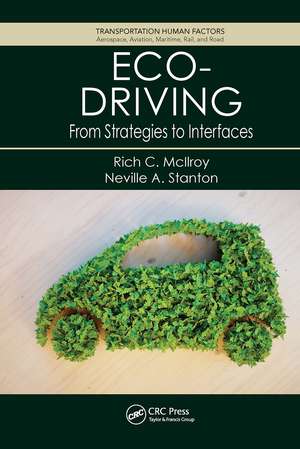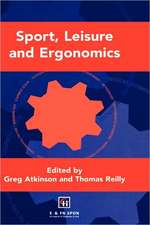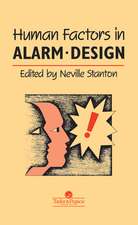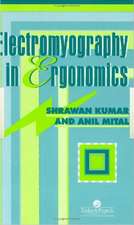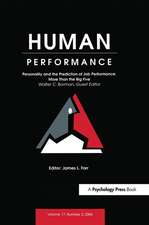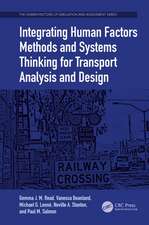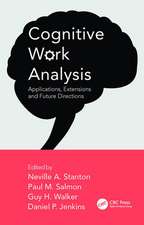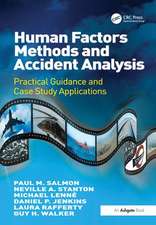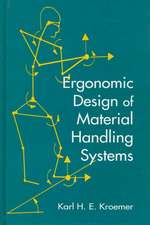Eco-Driving: From Strategies to Interfaces: Transportation Human Factors
Autor Rich C. Mcllroy, Neville a. Stantonen Limba Engleză Hardback – 18 oct 2017
Preț: 786.38 lei
Preț vechi: 959.00 lei
-18% Nou
Puncte Express: 1180
Preț estimativ în valută:
150.48€ • 160.91$ • 125.46£
150.48€ • 160.91$ • 125.46£
Carte tipărită la comandă
Livrare economică 17 aprilie-01 mai
Preluare comenzi: 021 569.72.76
Specificații
ISBN-13: 9781138032019
ISBN-10: 1138032018
Pagini: 308
Ilustrații: 46 Line drawings, black and white; 13 Halftones, black and white; 30 Tables, black and white
Dimensiuni: 156 x 234 x 24 mm
Greutate: 0.57 kg
Ediția:1
Editura: CRC Press
Colecția CRC Press
Seria Transportation Human Factors
ISBN-10: 1138032018
Pagini: 308
Ilustrații: 46 Line drawings, black and white; 13 Halftones, black and white; 30 Tables, black and white
Dimensiuni: 156 x 234 x 24 mm
Greutate: 0.57 kg
Ediția:1
Editura: CRC Press
Colecția CRC Press
Seria Transportation Human Factors
Public țintă
Academic and Professional Practice & DevelopmentCuprins
Introduction. Design, Behaviour, and Energy Use. Driving and the Environment: An Exploratory Survey Study. Verbal Reports: An Exploratory On-Road Study. Two Decades of Ecological Interface Design, and the Importance of the SRK Taxonomy. A Decision Ladder Analysis of Eco-Driving: The First Step Towards Fuel-Efficient Driving Behaviour. In-Vehicle Information System Design. Ecological Driving with Multi-Sensory Information. When to Give Those Good Vibrations. Conclusions and Future Work. References. Appendices.
Notă biografică
Dr. Rich C. McIlroy received the B.Sc. (Hons) degree in psychology and the M.Sc. degree in research methods in psychology from the University of Southampton, UK, in 2008 and 2009 respectively. He was recently awarded his Engineering Doctorate by the same university, having been based in the Transportation Research Group, Faculty of Engineering and the Environment. He has published over 16 articles, across a variety of topics, including eco-driving and the effect of in-vehicle information on driving behaviour and fuel use, the effect of multi-sensory information on responding, the general utility of Ecological Interface Design, the link between expertise development and verbal reporting, the use of non-intrusive verbal reporting for information acquisition, and the ability of Cognitive Work Analysis, and its various components, to support decision making and system design in a variety of domains, from rail transport to system requirements specification.
Professor Neville A. Stanton, PhD, DSc, is a chartered psychologist, chartered ergonomist and chartered engineer. He holds the Chair in Human Factors Engineering in the Faculty of Engineering and the Environment at the University of Southampton in the United Kingdom. He has degrees in Occupational Psychology, Applied Psychology and Human Factors Engineering and has worked at the Universities of Aston, Brunel, Cornell and MIT. His research interests include modelling, predicting, analysing and evaluating human performance in systems as well as designing the interfaces and interaction between humans and technology. Professor Stanton has worked on design of automobiles, aircraft, ships and control rooms over the past 30 years, on a variety of automation projects. He has published 35 books and over 280 journal papers on Ergonomics and Human Factors. In 1998, he was presented with the Institution of Electrical Engineers Divisional Premium Award for research into System Safety. The Institute of Ergonomics and Human Factors in the United Kingdom awarded him The Otto Edholm Medal in 2001, The President’s Medal in 2008 and The Sir Frederic Bartlett Medal in 2012 were awarded for his contributions to basic and applied ergonomics research. The Royal Aeronautical Society awarded him and his colleagues the Hodgson Prize in 2006 for research on design-induced, flight-deck, error published in The Aeronautical Journal. The University of Southampton awarded him a Doctor of Science in 2014 for his sustained contribution to the development and validation of Human Factors methods.
Professor Neville A. Stanton, PhD, DSc, is a chartered psychologist, chartered ergonomist and chartered engineer. He holds the Chair in Human Factors Engineering in the Faculty of Engineering and the Environment at the University of Southampton in the United Kingdom. He has degrees in Occupational Psychology, Applied Psychology and Human Factors Engineering and has worked at the Universities of Aston, Brunel, Cornell and MIT. His research interests include modelling, predicting, analysing and evaluating human performance in systems as well as designing the interfaces and interaction between humans and technology. Professor Stanton has worked on design of automobiles, aircraft, ships and control rooms over the past 30 years, on a variety of automation projects. He has published 35 books and over 280 journal papers on Ergonomics and Human Factors. In 1998, he was presented with the Institution of Electrical Engineers Divisional Premium Award for research into System Safety. The Institute of Ergonomics and Human Factors in the United Kingdom awarded him The Otto Edholm Medal in 2001, The President’s Medal in 2008 and The Sir Frederic Bartlett Medal in 2012 were awarded for his contributions to basic and applied ergonomics research. The Royal Aeronautical Society awarded him and his colleagues the Hodgson Prize in 2006 for research on design-induced, flight-deck, error published in The Aeronautical Journal. The University of Southampton awarded him a Doctor of Science in 2014 for his sustained contribution to the development and validation of Human Factors methods.
Recenzii
Eco-Driving: From Strategies to Interfaces comes at an important time for humans in our race towards saving our life-supporting environment. McIlroy and Stanton apply a Human Factors and Ergonomics approach to demonstrate how we might design vehicle interfaces to achieve significant reductions in harmful atmospheric emissions through enabling more responsible driver behaviour. McIlroy and Stanton raise an interesting set of questions for future researchers to build on such as human interactions with regenerative braking, the impacts on traffic system design, and which haptic displays may be appropriate.
Professor Andrew Thatcher, University of the Witwatersrand, South Africa.
With sustainability as a key design goal for road transport systems, the topic of eco-driving is gaining increasing importance. Despite this, there is still a considerable lack of literature addressing eco-driving behaviors as well as the question how to best support drivers. This book steps into this gap and addresses several core issues such as the eco-driving strategies drivers use, the cognitive structure of these strategies as well as the best ways to assist drivers. McIlroy and Stanton apply well-proven human factors methods expertly to this domain and compile a helpful and much-needed contribution, both for researchers and for practitioners.
Professor Thomas Franke, University of Lübeck, Germany
Technology is changing what it means to drive, and the race is on to define the next generation displays and controls. This design challenge requires not just rethinking vehicle displays, but also rethinking the theoretical basis of vehicle interface design. McIlroy and Stanton provide such a rethinking through a deep analysis of ecological interface design. Ecological interface design is a powerful approach, but is rarely applied to driving and rarely considers anything but a graphical interface. McIlroy and Stanton address these limits and extend ecological interface design to eco-driving. This is an excellent demonstration of how to think differently about interface design for cars.
Professor John D. Lee, University of Wisconsin-Madison, USA
Professor Andrew Thatcher, University of the Witwatersrand, South Africa.
With sustainability as a key design goal for road transport systems, the topic of eco-driving is gaining increasing importance. Despite this, there is still a considerable lack of literature addressing eco-driving behaviors as well as the question how to best support drivers. This book steps into this gap and addresses several core issues such as the eco-driving strategies drivers use, the cognitive structure of these strategies as well as the best ways to assist drivers. McIlroy and Stanton apply well-proven human factors methods expertly to this domain and compile a helpful and much-needed contribution, both for researchers and for practitioners.
Professor Thomas Franke, University of Lübeck, Germany
Technology is changing what it means to drive, and the race is on to define the next generation displays and controls. This design challenge requires not just rethinking vehicle displays, but also rethinking the theoretical basis of vehicle interface design. McIlroy and Stanton provide such a rethinking through a deep analysis of ecological interface design. Ecological interface design is a powerful approach, but is rarely applied to driving and rarely considers anything but a graphical interface. McIlroy and Stanton address these limits and extend ecological interface design to eco-driving. This is an excellent demonstration of how to think differently about interface design for cars.
Professor John D. Lee, University of Wisconsin-Madison, USA
Descriere
Eco-driving has the potential to save fuel and reduce emissions without having to make any changes to vehicles or road infrastructure. This book provides an in-depth understanding of the contemporary issues in the human factors aspects of eco-driving strategies and interfaces and the effects on driver behaviour.
